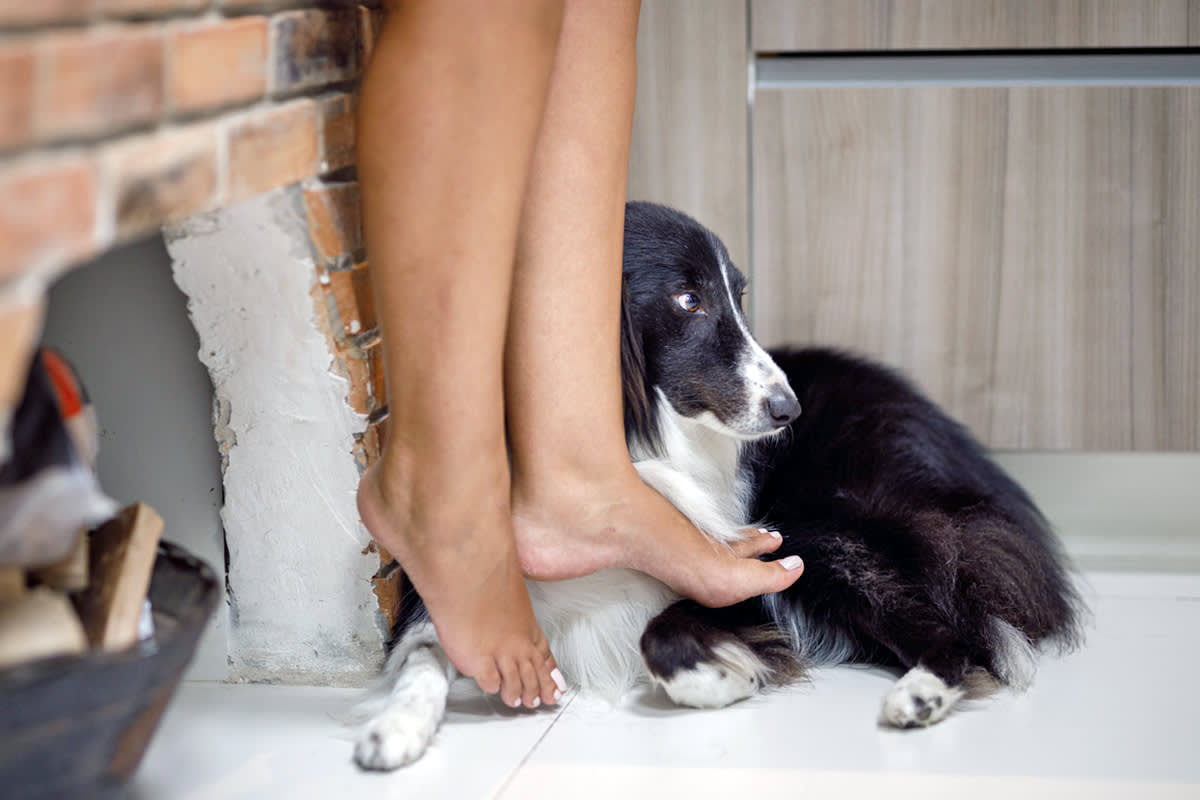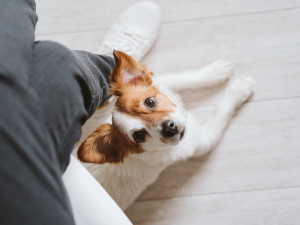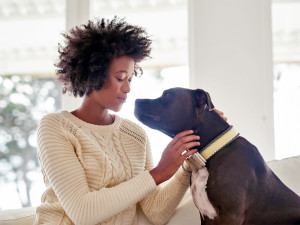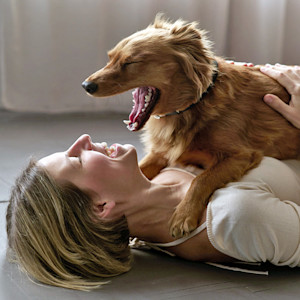Why Does Your Dog Lick Your Legs After You Shower or Moisturize?
We asked the experts why our dogs can’t get enough of our damp calves.
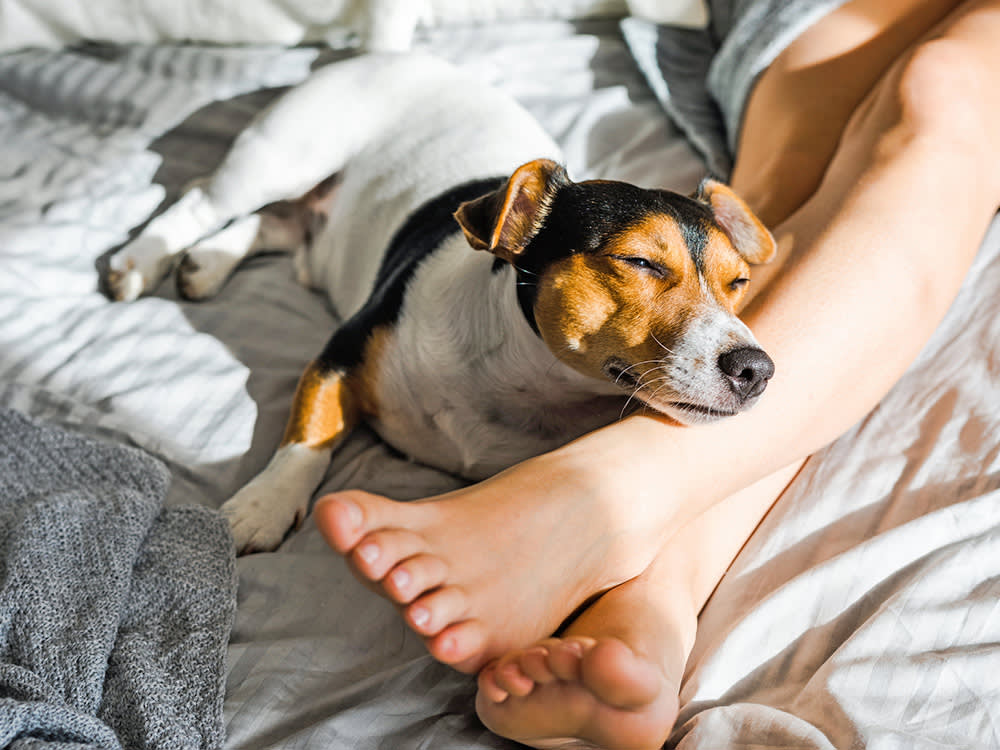
Share Article
What is it about wet legs that dogs find so enticing? It’s happened to us all before: You step out of the shower all nice and clean, you start to towel off, and all of a sudden, you feel a faint tickle on your calf. You look down and see your dog lapping the dew off your skin like it’s beef broth, and they haven’t eaten for days. What the hell is going on there?
As with most doggie behaviors, the reasons why dogs lick our legs after we’ve showed or moisturized can vary. To figure out what’s making your dog lick like there’s no tomorrow, you’ll have to use context clues.
But what if your dog licks a lot? In some cases, compulsive licking can signal deeper problems. Also, if you’ve moisturized your skin after your shower and your pup licks it, certain ingredients could be putting them at risk. To get to the bottom of this behavior and learn how to keep dogs happy, healthy, and well-hydrated, I spoke with board-certified veterinary behaviorists Karen Suedaopens in new tab and Camille Squairopens in new tab.
Why does your dog lick your legs after you shower?
The answer here will depend on both the specific situation and your dog. Generally, dogs give us post-shower kisses to show affection, get new information, or, in some cases, quench their thirst.

Your legs might be tasty.
Whenever my dog licks my legs, my first thought is, Don’t you have water? Sometimes, however, it’s less about thirst and more about tasting something new.
As Sueda points out, the water in your shower might taste different than the water in your dog’s bowl — especially once it drips off your legs. “Water that has been left in a bowl for a while may taste a bit ‘stale’ compared to more aerated shower water,” Sueda says. “This may also be why some dogs like drinking out of a fresh bowl of water rather than one that has been sitting out for a while.”
If nothing else, your dog’s leg-licking could be a useful reminder to refresh their water bowl more often. Speaking of which, I’ll be right back…
They might want to say hello.
OK, I’m back.
You know that stereotype about how dogs miss us from the moment we leave their sight, even if we’ve only been gone for five minutes? Well, your showers probably last at least 10 — so there’s a decent chance that your dog is licking your legs because they are glad to have you back where they can see you.
As Squair points out, licking in general can also be a way for dogs to communicate that you’re part of their pack. By licking your legs after a shower, your dog might be trying to reinforce that bond.
They might be thirsty.
This one’s less likely, assuming your dog has consistent access to water. Still, Sueda says, it’s possible that if your dog is licking your wet legs, they’re simply quenching their thirst. “Some dogs may enjoy licking water from a surface rather than lapping it out of a bowl,” she says, “similar to a person who enjoys sipping from a straw rather than gulping from a glass.”
They might be investigating.
Just like your dog might’ve missed you during the short eternity you spent lathering up, they could be wondering what you’ve been up to. Per Sueda, “Licking may also be a way for them to gain information about your whereabouts.”
If your dog doesn’t often see your legs (like, say, because you usually wear long pants) that could also enhance the appeal, Squair says. “Maybe that section of your leg or area of your body isn’t always available for them to be able to groom and lick, and so it’s a novel place for them to be able to do that,” Squair says.
They might want attention.
Do you usually respond to your dog’s kisses with fawning responses and a lot of cooing? In that case, the post-shower leg snogs might be a plea for affection. “Your dog may lick you when you get out of the shower if they want your attention,” Sueda says, “especially since you’re a ‘captive audience.’”
They might be stressed out.
How good is your dog with separation? For some dogs, even a brief absence can get the anxious gears turning — and as Squair notes, excessive licking can be a sign of stress.
Licking can be a type of displacement behavior, Squair says — a dog’s version of twirling their hair or shifting weight from one foot to the other when they’re nervous and don’t know what to do with their bodies. As she puts it, “There can be kind of an internal kind of soothing factor that goes with that.”
To be clear, not all dogs who like to lick wet legs have separation anxiety — and not all dogs with separation anxiety will be drawn to damp limbs. Still, Sueda says, if your dog seems unusually panicked when you step out of the bathroom, or if they show other signs of anxiety, consult with your vet to rule out any deeper issues.
Should you worry if your dog is licking shower water off your legs?
The first question you must ask yourself: Do you mind the licking or not? “If you don’t mind your dog licking your legs, no intervention is needed, unless you believe your dog panics when you are separated from them,” Sueda says. “If your dog only licks you occasionally, their behavior may not need to be addressed.”
But if you don’t like the extra attention when you step out of the shower, Sueda offers two suggestions: Shut the bathroom door and/or offer your dog something more interesting to lick. Try out toys, like lick matsopens in new tab and soothing saucersopens in new tab or a long-lasting treat, to redirect your dog’s enthusiasm. Or ask another member of your household to distract your dog with a walk or a toy.
If you’re worried your dog’s licking might signal a deeper issue, Squair suggests assessing their overall behavior to see how often it happens in other contexts. In certain situations, compulsive licking can reflect gastrointestinal (GI) upset or esophageal discomfort. Check to see how easily your dog can be redirected away from the licking toward another activity. If it’s hard to break their focus, or if they keep returning to the behavior, it might be time to call the vet.
Why does your dog lick your legs after you moisturize?
We all have our vices. For some dogs, it’s shower water — and for others, it might be your favorite lotion that you put on after you’re squeaky clean. (Shea butter is still butter, after all... right?) Much like when you first step out of the shower, Squair says, the new smells and tastes associated with your moisturizer might be appetizing to your dog. (“Some of them taste good.”) In other cases, your pooch might simply be sniffing out your new scent.
Sueda agrees that to some dogs, the taste of moisturized legs or hands might be even more appealing than shower water. “Your dog may enjoy the taste of the moisturizer or lick you to gain information about this novel scent,” she says.
Is it safe for your dog to lick lotion off your legs?
This will depend on the product, but in general, Sueda points out, lotions and skincare products are not intended for consumption — human or canine — and might contain ingredients that are dangerous for dogs. Besides, she adds, “the moisturizer won’t do you any good if your dog licks it off.”
Most moisturizers are dilute enough that if your dog steals a stray lick off your ankle, they’ll probably be fine. That said, Squair says, if your dog is prone to licking, you’re best off avoiding highly concentrated essential oils or any products containing xylito l, a sweetener that’s highly toxic to dogs and can be found in some lotions. Make sure you don’t allow your dog unmitigated access to your moisturizer — for your sake and theirs. And always make sure you look at the label to make sure they haven’t consumed something toxic if they do get ahold of it.
When should your dog see a vet?
If your pup compulsively licks and has trouble refocusing on other things, it could be a symptom of a physical illness (like allergies) or, in rare cases, a neurologic disease. Squair recommends watching for changes in behavior, which could be another sign that something is wrong. If you notice a new behavior, ask yourself how often it’s happening and for how long — and whether it’s easy or difficult to get your dog to stop.
If your dog tends to lick or chew on themselves a lot, especially alongside other symptoms like vomiting or soft stool, Sueda recommends scheduling an exam at the vet’s office to rule out illness or disease. After all, she says, “It’s always best to err on the side of caution.”

Laura Bradley
Laura is a New York-based experienced writer and mom of two rescue pups. Her work has appeared in Slate, Vanity Fair, Daily Beast, The Washington Post, The Atlantic, Yahoo! News, Vulture, Grazia Magazine, and more. When she is not writing or walking the pooches, you will probably find her in the community garden.
Related articles
Why Does My Dog Eat Rocks?
That is not a treat, pal.
Why Does My Dog Follow Me Everywhere?
They are the cutest little shadow.
Why Does My Dog Keep Licking Their Lips?
It’s not always just because they want whatever you’re eating.
Why Does My Dog Snore?
It seriously sounds like another human being is in the room.
Why Does My Dog Stare at Me? Possible Reasons and What to Do
Beyond the fact that they’re your biggest admirer.
![Dog yawning at home with owner.]()
Why Does My Dog Yawn So Much?
Reasons aside, it’s pretty darn cute.
